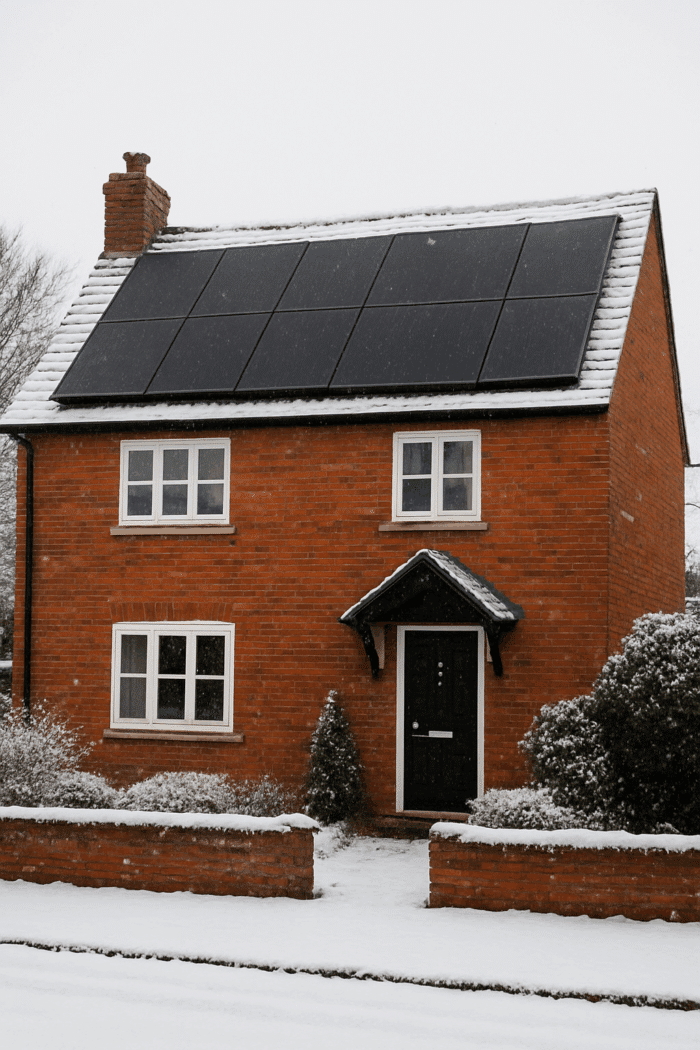It’s a common belief in the UK: solar panels are only useful in the summer. Long, grey winters, short daylight hours, and overcast skies lead many homeowners to assume that solar just won’t deliver when it’s needed most.
At Novus Energy, we hear it all the time:
“Why invest in solar if it barely works from November to February?”
The short answer: solar panels absolutely work in winter, and for many households, winter months still contribute significantly to annual energy generation. In fact, understanding the data may completely change the way you view solar energy.

Myth: Winter Makes Solar Panels Useless
Many UK homeowners believe that when the sun sets early and the skies are grey, solar panels stop producing electricity. The truth is far from it.
Modern solar panels generate electricity from daylight, not just direct sunlight. Even on cloudy or snowy days, diffuse sunlight still hits your panels, allowing them to generate power.
Example: A 4kW solar system in northern England can produce around 2,000–3,000 kWh per year in winter months alone, enough to cover a significant portion of your household energy use during the high-demand season.
Why Winter Solar Can Be Surprisingly Effective
- Cooler Temperatures Improve Efficiency
Solar panels operate more efficiently in cooler temperatures. Excess heat in summer can slightly reduce output, whereas crisp winter days can actually boost panel performance relative to sun intensity. - High-Usage Periods Coincide With Production
Winter is when energy bills spike. Heating systems, lighting, and appliances consume more electricity during shorter, darker days. Even partial energy generation in winter can offset expensive electricity from the grid. - Battery Storage Extends Value
By storing excess daytime energy in batteries, households can use solar power during evening peak hours, maximising winter savings. Homes without storage can still benefit from exporting energy to the grid via feed-in tariffs.
The Data Speaks for Itself
A typical 4kW system in the UK:
| Month | Average kWh Generated | Typical Electricity Bill Offset |
|---|---|---|
| December | 150–200 | £30–£40 |
| January | 150–200 | £30–£40 |
| February | 200–250 | £40–£50 |
Even in the darkest months, solar panels pay for themselves in bill reductions, and that doesn’t even include summer generation, which often exceeds winter output by 3–4x.
Annual takeaway: A typical UK system can still offset 20–25% of household energy use during winter. Over the lifetime of the system, these months contribute thousands of pounds in savings, helping to buffer households against energy price spikes.
Other Winter Considerations Homeowners Often Overlook
- Snow: Snow actually reflects sunlight, which can slightly increase generation once panels are cleared. Light snowfall often slides off panels naturally due to their tilt.
- Low Sun Angle: Short days don’t mean no production. Panels still capture daylight, and winter energy can complement summer production when stored.
- Smart Energy Management: Modern apps and smart meters allow you to align your electricity use with generation periods, maximising winter savings.
Solar Works Year-Round
Winter scepticism is understandable, but outdated. Solar panels in the UK are not just a summer luxury, they are a year-round investment that delivers tangible savings, increases energy independence, and protects you against future electricity price hikes.
At Novus Energy, we help UK homeowners design solar systems that optimise winter output, even for roofs with shading or tricky orientations. Our team ensures your panels are installed efficiently and safely, maximising return on investment throughout the year.
💡 Pro tip: Don’t let winter stop you. Every month your roof sits idle, your energy bills keep climbing, while solar panels could already be working for you.
✅ Book a Winter Solar Consultation
✅ See How Much You Could Save This Winter With Solar